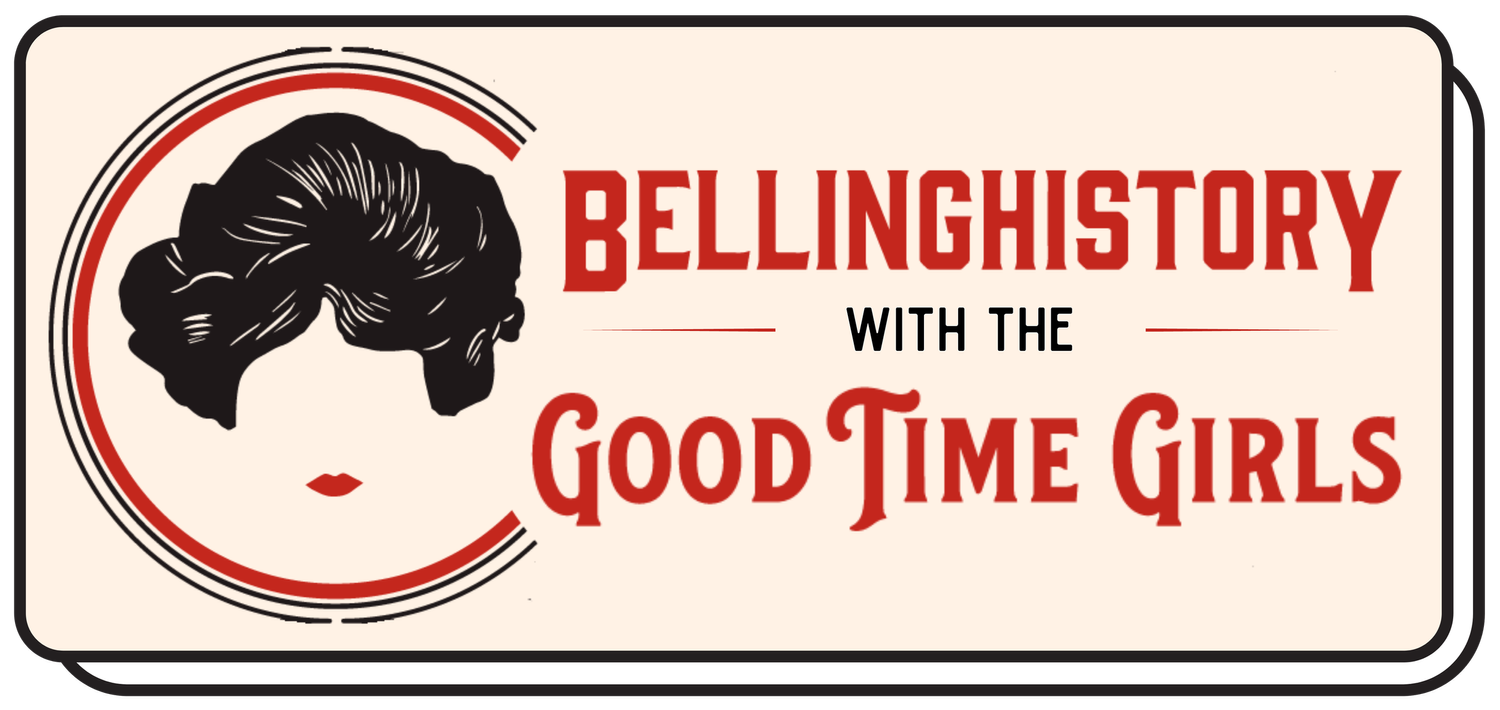Mr. Noel Wore a Dress and Welcomed the Guests
Written and published in The Betty Pages in February 2023
Over on the south side of town on Harris Avenue near Padden Creek there is a granite marker embedded in the sidewalk that reads “Trocadero Music Hall, 1902. Dance Hall with Prosperous Ladies Called 'Hell on Earth.’” One of over fifty historic markers placed around the Fairhaven neighborhood, this plaque replaced an earlier version that had been repeatedly vandalized. It seems a decision was made to replace the original marker with one featuring less ‘triggering’ topic. The original featured the phrase: “Mr. Noel Wore a Dress and Welcomed the Guests.”
Historic marker in Bellingham’s Fairhaven Neighborhood, on Harris Avenue near Padden Creek and Evil Bikes. The marker reads: “Trocadero Music Hall 1902. Dance Hall with Prosperous Ladies Called ‘Hell on Earth.’”
The Trocadero stood next to a row of saloons and brothels in the town of Fairhaven, which consolidated with the town of Whatcom as Bellingham in 1903. That same year the Trocadero re-opened as the latest incarnation of the Casino Theater, known locally as a “notorious dive.” Established in 1889, the Casino was described as “worse than either the saloon or the brothel, for it was the open door to both.” The Trocadero followed in the Casino’s footsteps - when one theater was shut down, another would soon open with the same offerings.
Variety theaters were common across the west during the late 1800s/early 1900s, serving as all-purpose low-brow entertainment resorts. Shows consisted of a hodge-podge of short plays, songs, dances, comedy, circus acts and wrestling matches. The promoters were not touting family friendly entertainment, and few women would be caught dead patronizing these establishments. The clientele was almost entirely male. Drunken hecklers, fistfights and even shootings were routine.
A surviving playbill from the Casino dated 1891 shows that acts included “Miss Alice Clifford, In her Wonderful Club Manipulations” (juggling), “Miss Fanny Pierce, in her great Contortion Act,” “Miss Sallie Clinetop, The Refined Fancy Toe Dancer,” and “the Queen of Magic, Miss Tillie Russell.” These misses were clad in tights and other titillating leg-revealing attire at a time when showing ankle was scandalous.
“The Clinetop Sisters” were dancers on the early vaudeville circuits. Sallie performed as ‘the refined fancy toe dancer,” at the Casino Theater in Fairhaven in 1890. This image may be her sister Lucy, however!
These performers traveled the country on a circuit, performing in small theaters across the continent. To supplement the traveling acts, theaters employed in-house musicians, and a handful of local performers as a “stock” company. Among its staff, the Casino Theater employed one of the area’s first drag performers, a “female impersonator” named Joseph Noel.
Joseph Noel made local news when he married another performer known as “Midget” Webber on Halloween Night in 1903, and again in January of 1904 when he filed for divorce. Noel’s status as a female impersonator and his brief marriage were remarkable enough to make the newspaper, but he left few traces besides. For persons living on the margins, often the only records available are sensational news items and arrest records, leaving many gaps in their stories.
Theater as an art form has a long history of tolerance for so-called cross-dressing, in part because of strict ideas about women’s roles in society. In Elizabethan England it was illegal for women to act on stage professionally, all-male theater companies were the norm and it was accepted that men “playing women” were “just acting.” During the era of variety theater and vaudeville between the 1880s and the 1920s, though it was still rather scandalous for a woman to be a performer, both female and male impersonation acts were extremely popular.
Some female impersonator acts were comedic, playing up the hilarious idea of a man in woman’s clothing and lampooning the crazy ways of women. Other acts centered on the “astonishing illusion” of the performer’s ability to pass as the other gender. Impersonator acts of this era (as well as modern drag performances) simultaneously had the potential to be both subversive as well as to reinforce heteronormative gender models.
The theater was a place of potential freedom of expression a person could be arrested for on the streets. At the time of incorporation in Bellingham in 1903, a city ordinance criminalized appearing publicly “in a dress not belonging to his or her sex” along with “offenses against public morals and decency.” The theater was a place where performances pushing the boundaries of gender expression were accepted or at least tolerated in the name of entertainment.
While we don’t know for sure why vandals targeted the marker that mentioned “Mr. Noel” wearing a dress, in changing the wording it appears that it was reassessed as being too controversial, calling into question tolerance for gender-nonconformity in our community.
Historical markers have their own fraught history, often reflecting the ideals of the persons who created them, and the times they were created in. How we view and interpret them also changes over time. The Fairhaven historic markers are no different, and have been analyzed, critiqued and sometimes updated - for better or for worse depending on perspective.
The marker was a small reminder that issues of gender identity are not new and that drag shows existed here in Bellingham at the turn of the previous century. The marker has been lost, and the historical record of Joseph Noel’s life is sparse. We can keep telling what we know of his story: Mr. Noel wore a dress and welcomed the guests.
You can help support the Betty Pages by subscribing on Patreon here: https://www.patreon.com/TheBettyPages









Percy teamed up with another female impersonator who went by Lou Lalonda. Percy and Lou were billed at Bellingham’s Grand Theater on Holly Street in September of 1905. At the time of their performance in Bellingham, papers described them as “two pretty young ladies who easily win applause.”